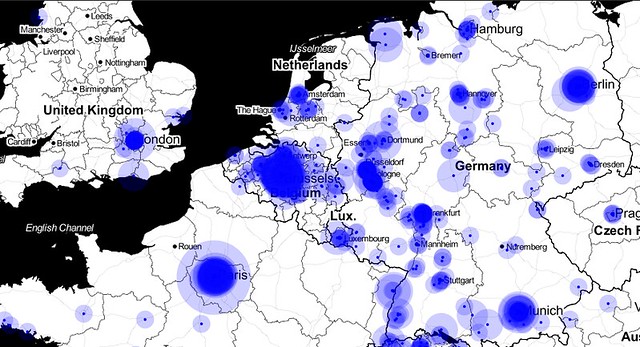Lobbyist registers are supposed to enable citizens to find out who is lobbying whom for what, and how much they are spending in the process.
They are supposed to help to safeguard against big money having an unfair influence in politics – ultimately to ensure that political decisions are based on argument, evidence and democratic deliberation, and not bought with cash from the highest bidder.
We think lobbyist registers are an essential part of government transparency, and that every country in the world ought to have one.
Furthermore we think it is essential that lobbyist registers are published as open data so that their contents can be easily analysed, queried, and connected with other information sources.
As we’re increasingly seeing corporations and special interest groups lobbying across borders, we’d like to track how big money is shaping discussion and decisions about issues that matter – from energy and the environment to tax and trade – in countries around the world.
We think that this kind of inquiry is essential for democracies to function.

While the UK is a world leader in opening up its public data, unfortunately the proposed Lobbying Bill in its current form will not deliver the lobbyist register that the UK needs.
Aside from widespread concerns that it will have a “chilling effect on civil society and its freedom of expression”, the bill contains major loopholes and omissions which means that it will not deliver real or meaningful transparency around lobbying in the UK.
Firstly, the bill would only apply to a fraction of the UK’s £2 billion lobbying industry. It would only require disclosures from those whose main business is lobbying. Hence it would not cover companies who have in-house lobbyists, big lobbying consultancies who offer a range of services, and other entities which offer lobbying services such as think tanks, law firms or management consultancies. And for those whose main business is lobbying it only covers those who lobby the highest echelons of government – not special advisers or mid-level civil servants.
Secondly, the bill would require lobbyists to disclose very little information about their activities. Essentially it asks lobbyists for a list of their clients and nothing at all about which issues they lobby on, which departments they target, or how much they are paid.
We at the Open Knowledge Foundation sincerely hope that the proposed bill will be revised to address these and other limitations.
If the bill goes ahead as it is, then it will be a significant missed opportunity for government openness in the UK, and a major blow to the government’s aspiration to be – in the words of the Prime Minister – “the most open and transparent government in the world”.
If you’d like to read more you can take a look at SpinWatch’s analysis. While MPs voted for a second reading last night, there’s still time to ask them to reconsider the bill. If you’re based in the UK you can write to your MP either via SpinWatch’s form or with your own message at WriteToThem.
Dr. Jonathan Gray is Lecturer in Critical Infrastructure Studies at the Department of Digital Humanities, King’s College London, where he is currently writing a book on data worlds. He is also Cofounder of the Public Data Lab; and Research Associate at the Digital Methods Initiative (University of Amsterdam) and the médialab (Sciences Po, Paris). More about his work can be found at jonathangray.org and he tweets at @jwyg.









1 thought on “The world needs better lobbyist registers – but the UK’s proposed lobbying bill won’t help”
Comments are closed.